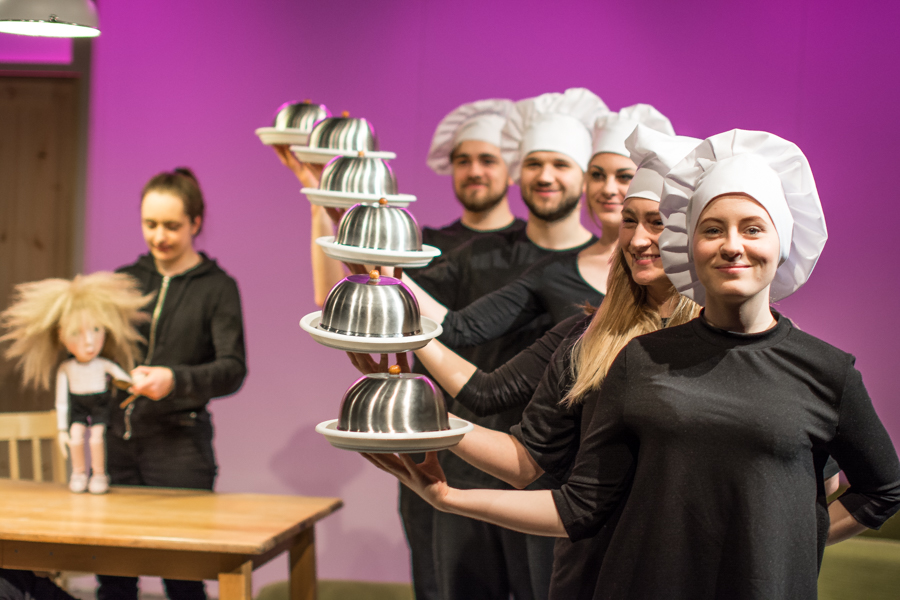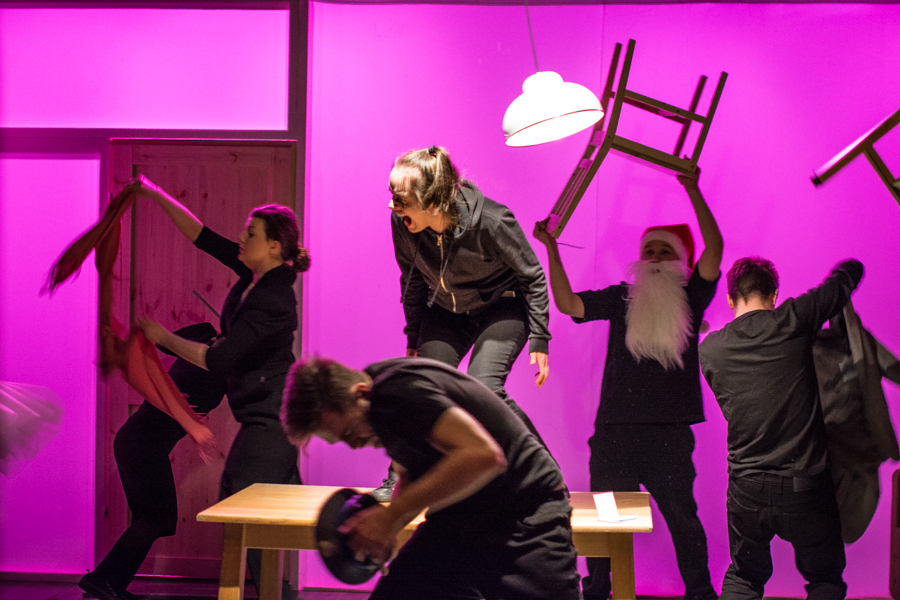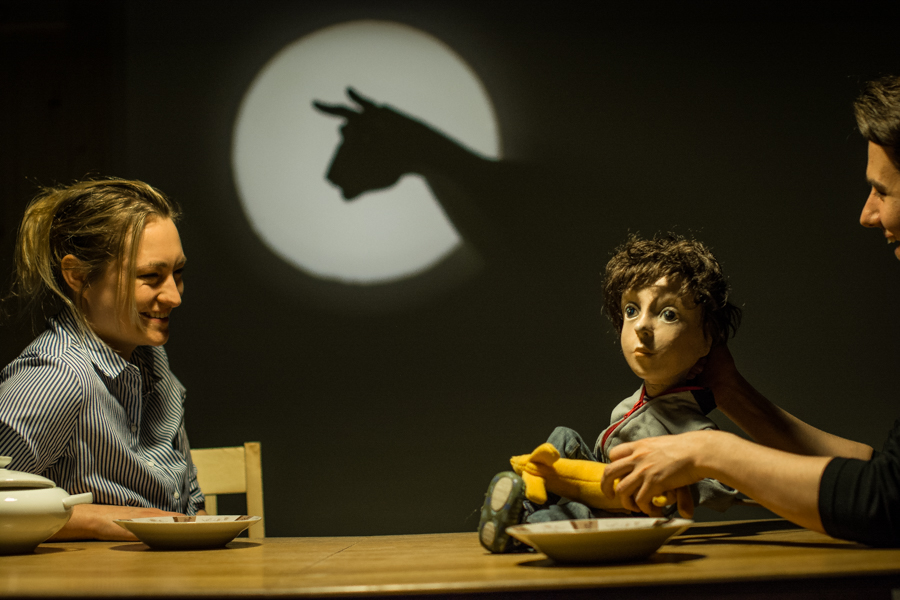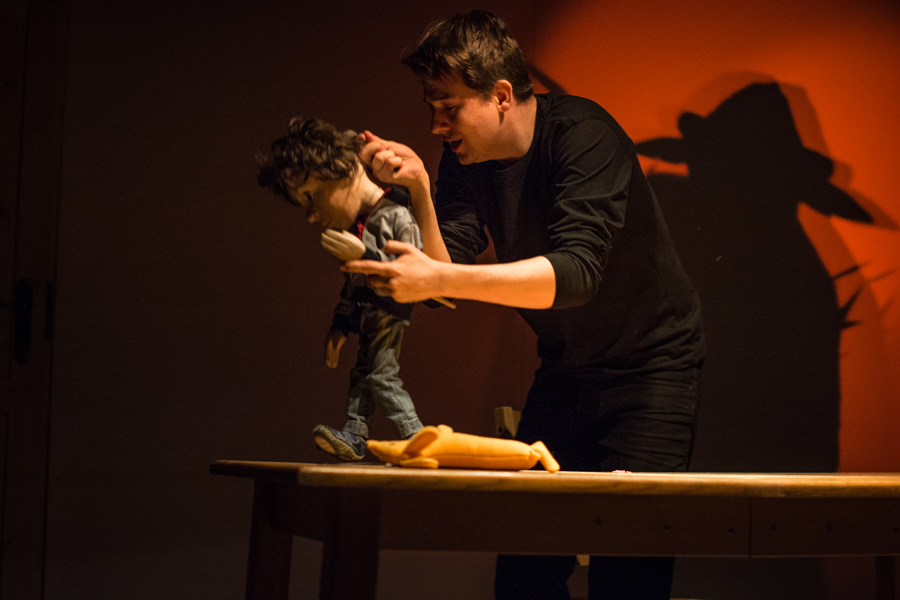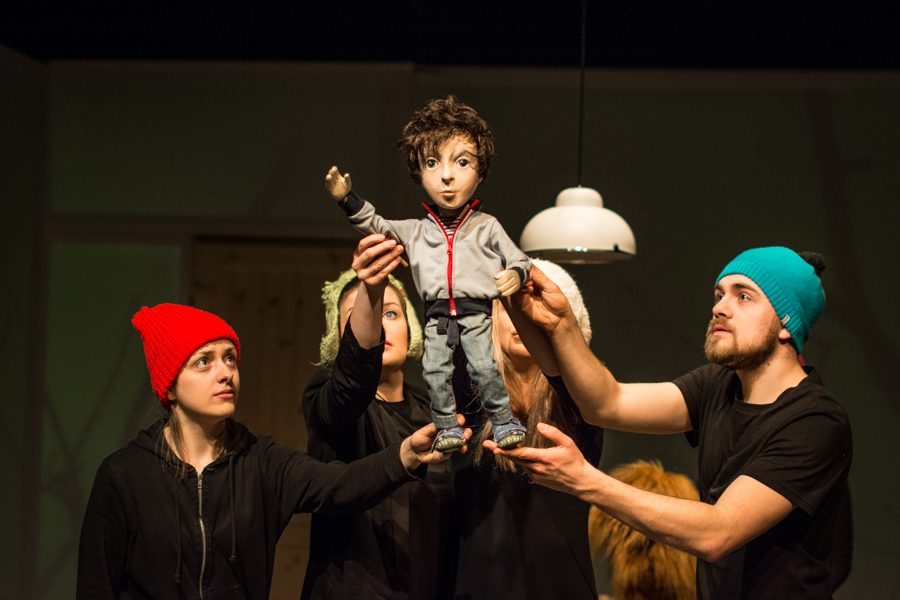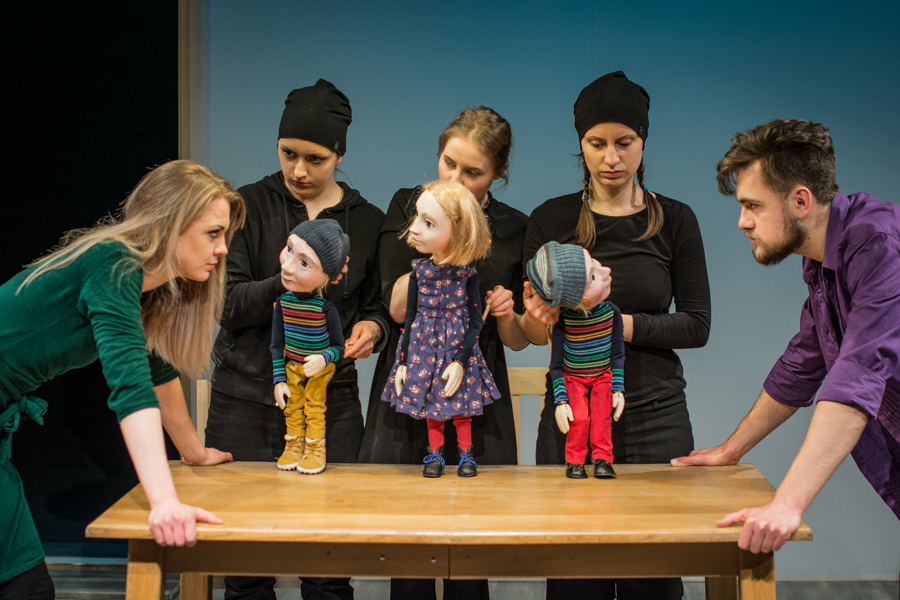na podstawie książek Gro Dahle „Grzeczna”, „Zły Pan”, „Wojna” / based on Gro Dahle’s books “Angry Man” and “Nice”, “War”
Przekład / Translation: Helena Garczyńska, Paweł Urbanik
Adaptacja i reżyseria / Adaptation and direction: Mateusz Przyłęcki
Scenografia, kostiumy, projekty lalek / Scenography, costumes, puppets: Martyna Štěpán-Dworakowska
Muzyka / Music: Tomasz Krzyżanowski
Reżyseria świateł / Light direction: Tomasz Grygier
Sekwencja cieniowa / Shadow sequence: Agnieszka Polańska
Konsultacje / Consultations: Jacek Dojlidko, Ewa Gajewska-Jasińska, Anna Kołosow-Ostapczuk, Agnieszka Makowska, Błażej Piotrowski, Cezary Szyfman
Obsada / Cast: Joanna Kozioł, Paulina Kulas, Olga Nawrocka, Magdalena Słowik, Zofia Straczycka, Anna Złomańczuk, Adam Milewski (III rok / 3rd year), Daniel Skrzypczak, Mateusz Stasiulewicz (III rok / 3rd year)
Rodzice chcą dla swoich dzieci jak najlepiej, ale czasami wymagają od nich zbyt wiele, nieświadomie wplątują je w swoje problemy, ograniczają ich wolność poprzez przesadną kontrolę. Rodzina to system naczyń połączonych. Każde działanie dorosłych – świadome, czy nieświadome – zawsze odciśnie mniejszy lub większy ślad na ich potomstwie. Kiedy między mamą i tatą się nie układa, kiedy wydarza się między nimi coś trudnego, dzieci to czują i za wszelką cenę chcą ratować rodzinę przed rozpadem. W ten sposób, często nieświadomie, zajmują miejsce dorosłych i biorą na siebie olbrzymią odpowiedzialność. Zwykle jest to dla nich ciężar nie do uniesienia. Dobrze jeżeli dorośli w porę to zauważą, zajmą się uporządkowaniem swoich spraw i odciążą w ten sposób młodego człowieka, żeby mógł czuć się bezpiecznie i beztrosko przeżywać swoje dzieciństwo.
Parents want best for their children, but sometimes they demand too much from them, they unconsciously involve them into their own problems and they limit their freedom through too strong control. Family is a system of connected vessels. Adults’ every action – conscious or unconscious – always leaves trace on children. When things go wrong between mother and father, when something difficult happens between them, children feel it and at all costs try to rescue the family from breaking into pieces. In that way, children – often unconsciously – take over parents’ place by taking huge responsibility for the situation. Usually the responsibility is unbearable. It is good if adults notice it in time and take responsibility for making things better, relieve their children from this huge burden and allow them to feel safe and airly go through their childhood.
Język spektaklu / Language of the performance: polski / Polish
60’
Przedstawienie / Performance: Poniedziałek / Monday, 18.06.2018, 19:30 – ATB TEATR
Język spektaklu / Language of the performance: polski / Polish
O SZKOLE / ABOUT SCHOOL
Białystok POLSKA / Bialystok POLAND
AKADEMIA TEATRALNA IM. ALEKSANDRA ZELWEROWICZA W WARSZAWIE
Wydział Sztuki Lalkarskiej w Białymstoku
ALEKSANDER ZELWEROWICZ NATIONAL ACADEMY OF DRAMATIC ART IN WARSAW
Puppet Theatre Art Department in Bialystok
Wydział Sztuki Lalkarskiej Akademii Teatralnej imienia Aleksandra Zelwerowicza z siedzibą w Białymstoku powstał w 1975 roku. Rektorem Uczelni, która nosiła do 1996 roku nazwę Państwowej Wyższej Szkoły Teatralnej, był wówczas prof. Tadeusz Łomnicki, jeden z najwybitniejszych polskich aktorów. To jego decyzja zaważyła, że działające od 1 września 1974 roku przy Białostockim Teatrze Lalek trzyletnie Studium Aktorskie Teatru Lalek, kierowane przez dyrektora Teatru Krzysztofa Raua, zostało z nowym rokiem akademickim 1975/1976 przekształcone w zamiejscowy Wydział Lalkarski warszawskiej PWST im. Aleksandra Zelwerowicza, a słuchacze studium otrzymali indeksy wyższej uczelni artystycznej, jednej z nielicznych wówczas w Europie (choć drugiej już w Polsce, po Wrocławiu) szkół kształcących aktorów-lalkarzy.
W 1980 roku w Białymstoku powstał Wydział Reżyserii Teatru Lalek. Na początku lat 90. obydwa wydziały przekształcono w jeden Wydział Sztuki Lalkarskiej, z dwoma kierunkami: aktorskim i reżyserskim.
Absolwenci uczelni pracują w niemal wszystkich teatrach lalek, w wielu stanowią większość w zespołach aktorskich. Aż połową polskich teatrów lalek kierują wychowankowie białostockiej Akademii Teatralnej. Wielu dyplomowanych aktorów-lalkarzy znalazło zatrudnienie w teatrach dramatycznych, radiu i telewizji, gdyż szkoła białostocka oferuje wszechstronne przygotowanie aktorskie, odpowiadające zainteresowaniom współczesnego teatru (teatr plastyczny, teatr przedmiotu, lalki, maski i aktora).
Wydział Sztuki Lalkarskiej mieści się w centrum Białegostoku, w obszernym, secesyjnym gmachu, w którym zachowały się fragmenty dekoracji z początku XX wieku. Oprócz sal wykładowych, sal ćwiczeń aktorskich i lalkowych, pracowni teatralnych, plastycznych i muzycznych, auli, biblioteki, sali gimnastycznej, pracowni technicznych i warsztatów szkolnych, w kompleksie przy ul. Sienkiewicza 14 ma swoją siedzibę Teatr Szkolny, noszący od 1999 roku imię Jana Wilkowskiego. Scena Teatru Szkolnego to nie tylko miejsce prezentacji studenckich, to także miejsce spotkań z ciekawymi zjawiskami we współczesnym świecie teatru lalek, to przede wszystkim jeszcze jedna scena w mieście, skierowana do młodej, aktywnej, poszukującej publiczności Białegostoku.
Akademia Teatralna w Białymstoku od 2002 roku organizuje co dwa lata Międzynarodowy Festiwal Szkół Lalkarskich lalkanielalka.
Puppet Theatre Art Department of Aleksander Zelwerowicz State Theatre Academy in Warsaw, seated in Bialystok, was founded in 1975. The Rector of the School, which was back then called the State Higher School of Theatre, was Prof. Tadeusz Łomnicki, one of the most renowned Polish actors of all times. It was due to his decision that the three-year Puppetry Actors’ Studio, which had been functioning since 1st September 1974 by the Bialystok Puppet Theatre and managed by the Theatre’s director, Krzysztof Rau, was turned into an out-of-town Puppetry Department of Warsaw State School of Theatre. The students of the Studio became students of a higher school of artistic education and one of the few (the second one in Poland – the Wroclaw Academy being the first) such institutions training puppet masters.
In 1980, Puppet Theatre Directing Department was founded. During the early 1990’s, both departments were transferred into one Puppet Theatre Art Department with two faculties: acting and directing.
The graduates of the Academy work in almost all puppet theatres in Poland, in many they constitute the majority of theatre’s ensembles. More than half of Polish puppet theatres are directed by the Bialystok alumni. Many of the puppeteers have been employed in drama theatres, in the radio and TV, due to the fact that the school offers complete actor’s training, satisfying the needs of modern theatre (visual theatre, theatre of the object, puppet theatre, mask theatre and drama theatre).
Puppet Theatre Art Department is located in the very centre of the city of Bialystok, in a big building representing the Viennese Secession style, with ornaments dating from the beginning of the 20th century which have remained until this day. The building hosts lecture halls, rooms for acting and puppet animation classes, theatre, art and music workshops, an assembly hall, a library, a gymnasium, a technical workshop and, above all, the School Theatre. It is here that the students have the opportunity to present their work. It is also the place of meeting of most interesting puppetry phenomena from all over the world.
Theatre Academy in Bialystok is the organizer of the International Festival of Puppetry Schools Puppet-no-Puppet that takes place every other year.
